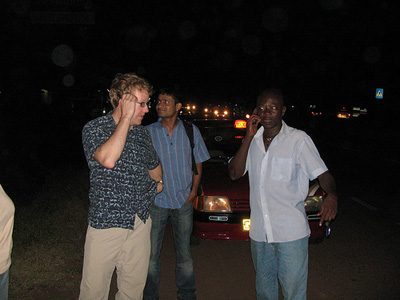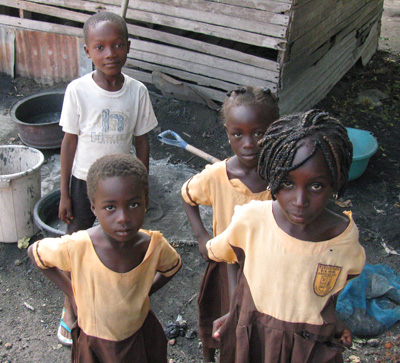Off the map
Get in a cab in Chicago and chances are better than not that your driver is from West Africa — often Ghanaian, usually Nigerian. In my experience they know the city as well as other drivers, if not slightly better — certainly better than I do.
And this is why I am utterly perplexed at what I now understand as bald fact: Ghanaians in Ghana are terrible at estimating distance. Ask three Ghanaians how far from points A to B and you will get wildly different estimates. Five minutes from one person versus thirty minutes from another is not unheard of. But even when you ask for distances in units of length you will get absurd variance, or no earthly idea at all. Far versus not far. And not far usually ends up being at least 30 km.
This person says Kumasi to Accra is 2 hours; that person says 6 hours. One of these people is wrong.
I heard a Ghanaian refer to GMT as “Ghana Man Time”. Cracked me up. (By the way, I was bisected by the real GMT yesterday.)
It isn’t just distance and time. Today I headed out on my own to arrange a dinner with some students from Michigan Tech working in Accra. I grabbed a map of Accra that had on it the restaurant I wanted to go to. I approached a cabbie who looked at the map. He flagged another driver, then another, then another, until I had a small crowd gathered looking at my guide book. Much excited chattering in Ga (different language here in Accra; my Twi was useless — or, rather, more useless than normal).
Finally it dawned on me. As politely as I could I asked “You don’t know how to read a map, do you?” They immediately all confirmed that the map itself meant nothing to them, though they easily read the labels and words. They were obviously not illiterate. Just cartographically illiterate.
Now, I understand that it is sometimes hard to abstract one’s street-level knowledge of a city to an aerial version of the same. It is a puzzle to be solved, a kind of cognitive transform that involves whittling 3D to 2D. But someone whose job it is to actually know the city you’d think would have this ability.
Perhaps one aspect of the Ghanaian inability to judge distance/read maps/know the location of anything is that streets are very rarely signposted and, if marked, not really known by name. See, even though the drivers could read the street names on my map they had never heard of any of them. It’s all so very bizarre.
Here is a typical cab experience:
“Can you take me to Tante Maria restaurant?”
“Sure!”
“Do you know where that is?”
“Yes.”
[drive along aimlessly for 20 minutes]
“Do you know where we are going?”
“Yes.”
[drive along for 20 more minutes, generally back the way ye came]
“Are you sure you know where we are going?”
“Yes.”
[Taxi stops. Driver gets out and randomly polls people on the street for directions. Gets back in. Drives for 20 more minutes.]
This last sequence — the stop-and-inquire — typically happens at least three times per journey. Usually the outcome is that the cabbie ends up not only not knowing where he is going but usually not even where he is. It is at this point that you cut your losses and bail out.
Clearly this lack of spatial awareness is not something biological. Ghanaians in the US do just fine. So it must be cultural, something about Ghana itself that causes spacetime to warp. Like the island in Lost.
10 days in Ghana
I’m in Accra, Ghana now, back where this adventure started last week. It’s been wonderful and exciting, exhausting and not a little frightening. Let me provide an example that covers a single twenty-four hour period last week.
We have a “handler” named Asha. She works for Citizens Development Corps, which is based out of Accra, so she’s our only daily contact in Kumasi. Asha’s great: 23, urbane, well-educated, and a serious party girl. (I’ve nicknamed her “Brimful”, a reference she both likes and gets.) We talk music.
Asha has a friend who owns a club in Kumasi. I believe I found that fact out approximately 100 seconds before she had him on the phone and had procured an invitation for me to DJ there. So, last Thursday, not even a week in Ghana, I hauled my laptop over to Time Out for a truly impromptu set. (OK, it wasn’t the least prepared I have ever been, but it was close.)
Apart from having no Nigerian music on hand — whoops — and some uppity patrons miffed that karaoke night was being upstaged by an obruni (Twi: “whitey”), it was pure joy.
I started with standard (even clichéd) Western tunes, quickly sprinted to more contemporary beats, veered over to Adam Beyer and Talvin Singh, did my best not to maul a bunch of Ghanaian High Life music I have, then ended with a long set of trance to placate the Tiësto-craving Lebanese who were crawling all over the plexiglass in front of the booth.
In short it was an amazing high. The club owner woke me up with a phone call at 7 the next morning to ask me if I would do it again. Quite a compliment, despite the hangover from the free (hooch) gin he paid me in.
And now a photo interlude. I just love the gazes of these kids.
The next day was a bit different. We were criss-crossing Kumasi on our way out of town to visit villages where traditional handicrafts are created. Talking to artisans and observing their trade in action was the first part of our task here (much more on which in a future post). It was thrilling.
As we were heading back into town for lunch our two Ghanaian colleagues in the front seat gasped and slowed the card down. Now, readers who have been to Ghana will know that no Ghanaian motorist ever gasps, blinks, slows down or really even cares. It is a massive deathrace free-for-all on the streets — a fact made laughable by the cheery Christian slogans painted on the back of nearly every car.
But gasp they did. Lying in the median of the street on the left side of our car, right outside my rolled-down window, was the dismembered corpse of a human being. It was a man. At first I thought it was a car crash victim, but as I looked closer I realized that he had been hacked with a long blade. It was perfectly obvious and completely nauseating, reminding me instantly of the way a roadside vendor had opened up a coconut for us the day before. The dead man’s head was flayed open from numerous machete blows.
But there was no blood on the street. This person had been murdered elsewhere, mutilated, and put out on show. A lynching. We pulled away and for several minutes the whole car was silent. I was shaking. Finally we tried to ask our hosts what in the hell we had just seen. They were upset too, though it was hard to tell exactly why.
They explained that crime was on the rise in the Ashanti region and that people were becoming increasingly unhappy with the sentences delivered by the court system. As such, vigilante murders were becoming more and more common as angry mobs sought to punish and deter crime. Obviously our hosts had no idea what crime this guy had committed — if he had done so at all — but that was their answer: vigilantism.
Fair to say that little episode annihilated any high I was riding from DJing the night before. I couldn’t shake the image, wished I hadn’t stared. We did little work the rest of the day that required lots of talking. No one really wanted to interact. That night none of us could sleep.
I suppose there’s an upside to being shaken so deeply. I’m much more sober about Ghana now. It’s still a wonderful and special place, but I think I can evaluate it more objectively now. The senseless horror of that corpse in the street (with children playing around!) pretty firmly knocked off the rose-colored glasses I had on.
In between these two poles of emotion are ten days of fantastic new experiences. I’ve uploaded all the photos to date and as much video as this poor bandwidth can handle. Here’s the full set, updated nearly daily.
Bear with me as I’ve not properly tagged or annotated most images yet (and some of them really require explanation). Also, most photos have no high-res version. Just too bandwidth-scarce over here. Will replace them when I am back home.
Stay tuned for a multi-part series on the visiting the artisan villages and documenting their work. Amazing stuff comin’.
Thanks for reading!
Ghana intermittent
I’m in Kumasi on an Internet connection frailer than a house of cards. But hey, better than nothing. Here’s the quick and dirty. We’re settled into Kumasi, our guest house, and our places of work. I’m stationed with two teammates at the Ghana Cultural Center, which houses my partner Aid to Artisans. Looks like an achievable list of tasks for four weeks and the workspace is as good as it gets. No air conditioning, but I did get to shake it with traditional Ashanti dancers during a break today. Can’t beat that.
Yes, there’s video of that, as well as some truly great photos — but the hard truth is that the connection in Kumasi is crap. (I’ve tested three places now.) Download is tolerable; upload horrendous. Can’t even get a single photo up. So, media may have to wait until I can get back to Accra. Shame. But on the other hand I guess I’ll just have to be more descriptive in my posts.
Tomorrow it is off to a few villages outside of Kumasi to meet the makers of three types of traditional arts: brass-, wood-, and textile-based. They are the beginning of the road in the supply chain and the beginning of our analysis, plus seeing them at work will be a great treat. Can’t wait.
So, expect a longish dispatch in the next few days. And sorry for the quick spurt of media then nothing. WAWA: West Africa wins again. (It has a bit of a streak going.)
Update: obviously I have added media where possible.
A little bit about Ghana
The more you know …
Ghana, formerly known as the Gold Coast, was the first nation in Africa to receive independence from colonial rule in 1957.
Accra, Ghana, capital of the country, is a sister city of Chicago, USA.
There is no place on Earth you can travel to and require more vaccinations than coastal West Africa.
Ghana is the size of the US state of Oregon (roughly 92,000 miles2).
The name Ghana refers to the ancient empire of Ghana located in Senegal, Mauritania, and Mali with no overlap whatsoever to the current geographical boundaries of the country.
Ghana is the country closest to the center of the globe, as defined by international measurement. The prime meridian runs through it and the equator is only a few degrees south of the coast.
An amazing amount of the world’s scrap electronics end up in Ghana for precious metal recycling.
This is the Cicero Guest House, where I will be staying. It ain’t the Four Seasons, but I’m not complaining.
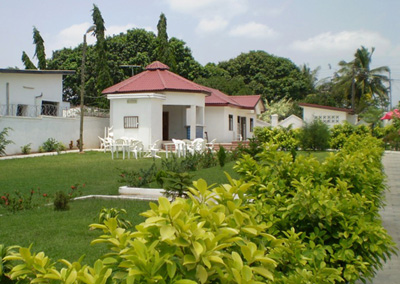
So that’s it for posts pre-departure — maybe until Aug. 15 given connectivity, but I doubt it. I’ll be chronicling the adventure here (much as I did in Italy exactly one year ago) and on the newly-launched official IBM Corporate Service Corps blog.
Thanks to everyone for the well wishes, offers to assist with the family while I am gone, and claims on my personal items should I not return.
Offline dance
We’ve been told there’s no Internet at the hotel in Kumasi (though an unsubstantiated report says the proprietor is “working on it”). The program manager has earnestly stood by his directive that we should experience the Internet the way Ghanaians do, which is to say (if they do at all) at public cafes.
I see the point. You can’t consult much less design for a culture whose particular constraints you do not understand. OK. But this my biggest concern since, as a team with a job to do involving (at least in my particular task) using the Internet as a route to market, this seems like an unfortunate and avoidable self-limitation.
But so it is. To make matters more challenging, we’re told that power cuts out in Kumasi two to three times a day. Many places have backup generators; many do not. So, you can imagine the near-panic I’m in being a creature of connectivity. I’m not proud of it, just laying it out truthfully.
It’s a reversal of the productivity direction I’ve been working towards for years: a near-total online workflow. Sure, I use desktop apps and love a few dearly. But they’re almost all hooked to networked data and have a web-based interface too. Most simply won’t work without a connection. My laptop is about to become an island.
Thinking through how it will actually work has been interesting, though. There are three scenarios, not counting the pipe dream of guest house Internet:
- Connection at place of work, relatively nearby Internet cafe
- No connection or very limited connection
- Machine failure
The first is the most likely, though it still involves long offline periods. It’s pretty easy really: e-mail gets pulled into Mail.app and calendar items into iCal whenever I can connect. NetNewsWire can suck down feeds for offline review.
But that leaves Backpack and Basecamp, two online services I use for personal and project task management. There’s a great offline synch app for Backpack called Packrat, but for Basecamp I’m basically hosed. In a stroke of great timing, my files at Google Docs now live offline thanks to the Google Gears integration it now offers. I compose blog posts in the superb MarsEdit so that’s not a worry. I suppose there are some offline Flickr apps, but that seems like such a hassle. IM, Twitter, virtual worlds: forget about it.
The second scenario is basically the same, only more dire. I suspect I will just abandon e-mail altogether and just compose offline blog posts hoping to cast their bottles into the sea at some point.
The last scenario — total computer death — had me considering bringing two laptops … until the sheer idiocy of hauling all that hardware to Africa brought me to my senses. (Some of my teammates are considering not even bringing one. What!?) When you consider that the closest Apple Store is half a continent and a sea away, you basically realize that letting go is easier than fighting it. If the MBP dies, my hipster PDA takes over.
If this particular calamity should come to pass I’ve loaded up a USB key with a bunch of portable apps so that I can at least fake the semblance of a personalized workspace at a public terminal. Loading critical data onto the key just isn’t practical, though, so I’ll basically be all dressed up with no place to go.
And yet. There’s an upside to these scenarios. There are still a few apps that require no connection at all. In fact, the distractions of the ‘tubes are actually a hindrance to using them in some ways. I’m thinking specifically of Ableton Live, but also tools like Tinderbox and Scrivener. All these are for personal composition. I can imagine being hunched monk-like in my room hammering out new tunes and chapters, perversely thankful for the isolation.
That is, if the electricity stays on. There are as yet no affordable (or compact) solar-powered solutions for laptop power. So, I have my three MBP batteries.
Add to all this worry that the iPhone 2.0 update and 3G hardware is released the day after I leave and you may understand better why I am obsessing more about Internet withdrawal than microbe invasion.
If this sounds like spoiled geek whining, you’re probably right. But I think this post will be a useful record to return to when the real conditions of daily work present themselves. I’m pretty sure I’m being shortsighted. Which is probably a good summary of my overall preparedness for this adventure.
Not too long now. Departure Thursday.
Love of country
In late 2001 we were giddy with our first child. The fallen towers and clingy new parent syndrome had pretty much bivouacked us into our condo. The last thing we wanted to do was bring a stranger into the home to be a nanny.
We interviewed a couple of ladies, all eastern European as I recall. Nice enough, all capable of tending a baby, none capable of making us feel good about it. Then we were referred to Margaret Kumi, a classy, soft-spoken mother of many. She was from Ghana.
During the interview Margaret good-naturedly answered my silly list of questions. I remember asking what the first thing she would do if our baby got hurt. She didn’t really understand what I was asking, probably because it was a trick question, and the right answer was so damn obvious. I wanted her to say “I’d call you,” but of course the answer was (and is): make sure the kid’s alright. Later, after we easily hired her, I reflected on how much more that question said about me than her.
Margaret was our full-time nanny for almost five years. We welcomed her into our family and, surprisingly, she did the same for us. We came to know her children, her adopted children, her husband, and visiting relatives from Ghana. We were introduced to baby naming parties, the glutinous food known as fufu, and the sonorous language called Twi.
Her connections with Ghana were strong; most of her family still lived there and she returned twice while she was in our employ. When I was working in Egypt I thought often of making a side-trip to Ghana — a longer flight than cross-country US, but a side-trip in my mind. It never quite worked, mostly because it required a layover in some sketchy Nigerian refueling depot on the FAA might-not-wanna-go-there list.
When I was accepted into the IBM Corporate Service Corps the program manager asked me where I wanted to go and I immediately said Ghana. Margaret and her family were ecstatic. It was a unique moment. You might think this closed some sort of circle, a postmodern Roots with a twist. But it sure didn’t feel like that. It felt like a start — and the wheels I could surely see turning in Margaret’s head confirmed as much.
A few weeks later off the high of the acceptance, during one of our Sunday evening Twi lessons, Margaret and her husband told me that they wanted my help. They had been thinking for a while of returning to Ghana. The country was doing well relative to West Africa and even absolutely for sub-Saharan Africa. Margaret wanted to open a daycare center in Kumasi. She said they had been trying to figure out a way to get back to Ghana while I was there so I could, in her words, help her figure out how to do start a business there. My emotions at this time were a somewhat perfect balance of eagerness and bewilderment.
I am an African know-nothing. I’ve read a few thousands pages on the continent and its history, peoples, and business outlook since I was accepted into the program, but let’s be clear here: I don’t know the first thing about starting a business in the relatively comfortable nest of the USA let alone Ghana. But how could I say no? Margaret is a product of Ghana and her care for my kids derived from that.
There’s another thing though. This isn’t payback. My desire to help Margaret isn’t what many characterize as Western guilt about Africa. I have no colonialist baggage; I feel no latent pangs over the slave trade (though you might ask me again after I visit the Middle Passage embarkation points). It’s more personal than that. Margaret came to America for a better life, remitted part of her earnings to her family in Kumasi as best she could, and then, because of mature governance and a world eager to help, she’s now afforded an opportunity to return home. It’s rare and, though our lives will be the lesser if it happens, so very right.
Margaret told me last week that she’s secured a plane ticket and will be there when I am. I couldn’t be happier.
It’s an interesting thing to reflect on this July 4 weekend. I’m proud of my country — and my company — for putting me in a position to help.
Artisan
So, you may know that I am headed to Africa for five weeks on a special assignment for IBM. It is called the Corporate Service Corps and it is a unique undertaking for a large corporation. For any company, for that matter. It is the Peace Corps meets multinational company meets corporate citizenship. I leave on July 10.
You’re thinking, good luck trying to sell a blade server or consulting in Ghana. Or, you shameless pigs, Africa needs basic infrastructure, not computing firepower. You’re right. But it isn’t either of those. We’re not selling; we’re completely cut off from the network of peers in the company that makes us corporate workers. We’re guns-for-hire working for tiny businesses.
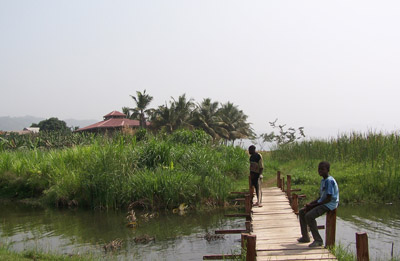
This program is the most globally-minded program I’ve seen IBM undertake in ten years. The idea is simple: send IBM’ers to places on the cusp of entering the global market and where we have no real presence. Might never have, in fact. But doing right by the global community isn’t just about doing so in markets in which we do business. You’re not believing that as you read it, but it is true. We are completely OK with the fact that we may never do business in Ghana, but that’s not really the point. The point is that it is frankly stupid to pigeonhole knowledge anywhere in the world. Helping one place will flow elsewhere. Better businesses in one place ultimately is good for other places. It’s not unlike environmental responsibility, actually.
There are multiple assignments per location. Mine is with the NGO Aid to Artisans. It’s goal: “to enhance income levels and employment generation in the craft industry in Ghana through product design and development, business training, market development, advocacy and advisory services.”
My goal? To help them develop an e-commerce site and understand their supply/value chain.
We’ll see. But I couldn’t be more excited.
In to Africa
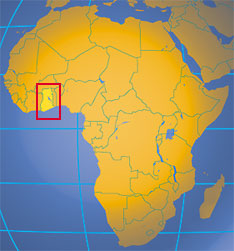
So, looks like my resolution not to travel as much in 2008 has officially been deferred to 2009.
Today I was notified that I have been accepted into a new program in IBM called the Corporate Service Corps that will place about 100 employees in “pre-emerging markets” around the world for month-long assignments.
It is a volunteer-oriented effort — not tied specifically to business goals per se — in places we have no real market footprint: Tanzania, Ghana, the Philippines, Turkey, Romania, and Vietnam.
The program pairs IBM teams with small businesses in these areas for one month to help modernize their business processes. Teams will be composed of a cross-section of technologists, industry experts, and business strategists. Peace Corps meets small business development.
The competition for the slots in the first waves of the program was pretty intense. Over 5,500 IBM’ers from more than 50 countries applied for about 100 slots. That probably says more about the unique opportunity than it does about general unhappiness with people’s dayjobs. Certainly does for me.
I don’t know exactly where I will be going, but I strongly suspect it will be Ghana, specifically the city of Kumasi, probably be this Fall. I’m thrilled.
This June I launch my project in China, the largest, most complex undertaking in my career. In August I mark ten years in IBM. To then do something as clearly different as working with a third-world business in a place like Africa is an opportunity for a change of perspective that I simply can’t pass up.
This quote from Paul Ingram at Columbia pretty much nails exactly why I applied:
The fact that you are an excellent programmer or salesman, or can lead a project in your own area and culture, doesn’t mean you can be a great leader outside of your technical or cultural expertise.
But it wasn’t an easy decision. The thought of leaving thelovelywife and midgets continually prompts a what-the-hell-have-I-done response. But they’ve been amazingly supportive. It is true that something feels very right about this. Maybe it is that I know it will have a significant impact on my career but in ways I can’t really foresee. I’m OK with that.
The other thing about Ghana, if that’s in fact where I’m headed, is that I have a built-in network of acquaintances there via our long-time (though former) nanny, Margaret Kumi. We haven’t told Margaret or any of the dozen other Ghanaian men and women we’ve befriended over the years, but my guess is that I’ll be shlepping a gross ton of gifts over to Africa. I am OK with that, too.
UPDATE: Confirmed, I’m going to Ghana in late September. Hooray!
Something tells me that this is going to rival last year’s Italian odyssey.
Some coverage from today:
Volunteering Abroad to Climb at IBM
IBM’s Corporate Service Corps Heading to Six Emerging Countries to Spark Socio-Economic Growth While Developing Global Leaders
More on this as I find out more. Yay new things!
Ghana@50

Today, the nation of Ghana and its sizable diaspora celebrate fifty years of independence from colonial rule.
My family, while not Ghanaian, feels a special affinity for the country. About six years ago, we first met Margaret Kumi, an experienced nanny looking for a new family. In short order she was part of ours, and we part of hers. She introduced us to the Twi language, Ghanaian foods, authentic kente cloth and a world much beyond our own. Margaret is no longer our nanny. She’s more like a grandnanny, a Poppins-esque treat for the kids.
Seems like just yesterday I was getting emotional for a country I’d never been to as they marched further into the World Cup than anyone thought.
And mark your calendar Chicagoans. Ghanafest 2007 is right around the corner.

